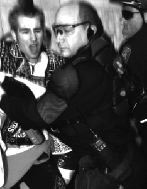MAYOR GREG NICKELS left a feeling of dissatisfaction in his wake after his first visit to the Seattle Human Rights Commission last week. While there, he refused to debate whether two recent, similar protests had received very unequal treatment from the Seattle Police Department.
The evening’s meeting was mostly concerned with how events unfolded on April 20 at the intersection of Broadway and Thomas, where approximately 200 people gathered in traffic without a permit for an anarchist-inspired Reclaim the Streets party/protest. According to witnesses, just as the peaceful party was beginning to disperse, police unexpectedly “crashed” into the crowd—using bicycles as shields—and began throwing some protesters to the ground and using pepper spray on others.
As a result, the police department faces an official complaint from the Human Rights Commission and is again defending itself against accusations that unnecessary force was used.
The mayor, however, believes that the police “conducted themselves well” that day. He also “disagrees with [the] characterization” by Tony Granillo, a member of the Human Rights Commission who was on Broadway observing the protest, that the police used excessive force. When asked to expand on that disagreement, Nickels curtly declined.
Four days before April 20, however, when 200 citizens led by the Rev. Leslie Braxton of the respected Mount Zion Church wanted to march without a permit to protest the death of a black man, Robert Thomas Sr., who was shot by a King County deputy (see “Sheriff Trouble,” p. 12), the city went out of its way to accommodate them. The marchers were issued an unrequested permit by the city. When the march unexpectedly and unlawfully veered onto I-5, where it also tied up traffic, officers on the scene gave the protesters a choice to stay and be arrested or to leave peacefully and continue their march. That choice was denied protesters April 20.
When commission members asked the mayor about this apparent double standard, his only reply was that “Mount Zion did have a permit” and “we protected their free speech,” while the group on Broadway was engaged in an “unpermitted activity.”
Charles Redell




